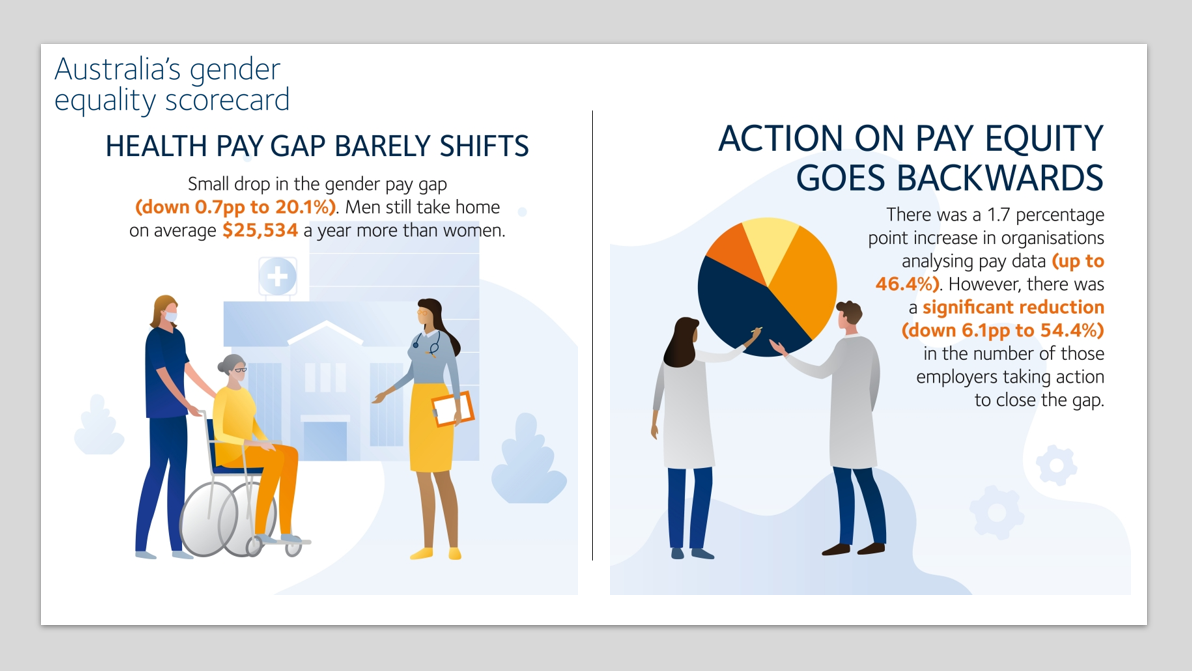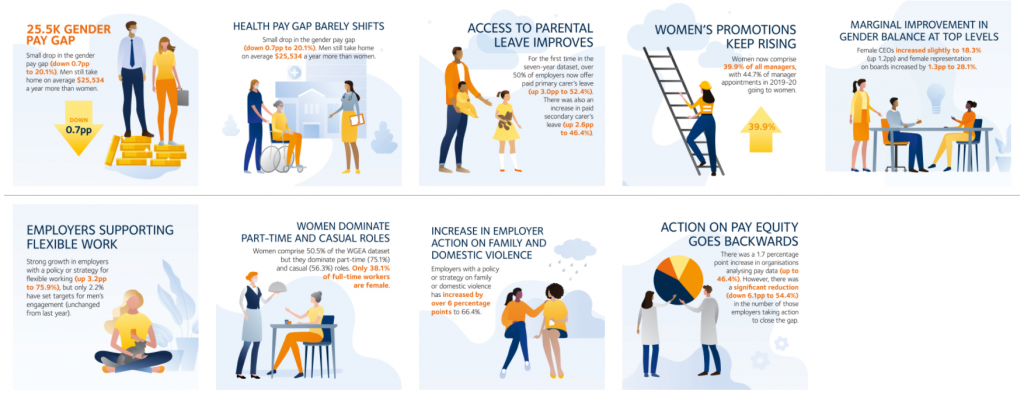Human Resources
New data shows Australian employers complacent on gender equality

Human Resources: Data released in November 2020 by the Workplace Gender Equality Agency (WGEA) shows a worrying decline in employer action on gender equality prior to the impact of COVID-19. Whilst the gender pay gap for total remuneration dropped just 0.7 percentage points (pp) to 20.1%, men still out-earn women on average by $25,534.
Other than the small improvement in the gender pay gap, access to flexible work increased and over 50% of employers now offer paid primary carer’s leave.
The most troubling finding was a substantial 6.1pp decline in the number of employers taking action on pay equity and women continue to dominate the more insecure part-time and casual roles.
The Agency’s Director Libby Lyons expressed her disappointment at this year’s results.
“Even before the COVID-19 pandemic hit, I was concerned that Australian employers had become complacent. The modest rate of change in last year’s results suggested they were in the grip of gender equality fatigue.
“I’m now very disappointed that almost nothing has changed this year. It appears to me that Australian employers are on autopilot when it comes to improving gender equality. The issue is clearly not receiving the necessary attention to drive further change.

“Without ongoing and increased employer action, we are likely to regress and will witness a decline in the many gains achieved over the last few years, such as the gradual reduction of the gender pay gap and more women in leadership roles,” said Ms Lyons.
According to Medicines Australia, the pharma industry is moving faster than others in addressing the gender pay gap. The research shows that over two thirds of companies in the pharma category have a pay gap of 5.1% compared to the broader average of 15.7% in the healthcare industry. The Pharma Australia Inclusion Group (PAIG) is proud of the industry’s progress to date, but also recognises that there remains work to be done to ensure the industry is one where everyone can thrive.
This year’s WGEA dataset offers a comprehensive snapshot of private sector employment as it was just prior to the imposition of COVID-19 restrictions. It provides an important benchmark for comparison to next year’s dataset, which will capture the full impact of COVID-19 on Australia’s private sector.
you may also like Reimagine the ‘new normal’ of HCP engagement
“I recognise that 2020 has been a very challenging year for employers and I appreciate their commitment to continuing to report their data, despite the upheaval and disruption caused by the COVID-19 pandemic,” said Ms Lyons.
“It means that we have an unbroken, world-leading, seven-year longitudinal dataset which is immensely important in measuring gender equality outcomes in Australian workplaces.
“The most disappointing result is the reversal in action on pay equity. This year, there is a decrease of 6.1 percentage points in the percentage of employers that took action to close their gender pay gaps. Just 54.4% of employers who did a gender pay gap analysis took action to close the identified gaps.
“This trend must not continue. Experience tells us that when employers measure their data, identify the problem areas and take action to address them, the pay gap closes.
“Our data also revealed further concerns. I always welcome an increase in the number of female CEOs and board directors but we are still decades away from achieving gender balance at the top levels of leadership. Progress on this issue remains glacial.
“There were some positive developments. For the first time since we started collecting data, over 50% of employers now offer paid primary carer’s leave to their employees. Women’s promotions and appointments to managerial roles continues to rise with women now comprising almost four in 10 managers in our dataset. I was also pleased to see another strong increase in employer action on family and domestic violence.
“Access to flexible work also improved. More than three-quarters of employers now have policies or strategies to promote flexible working. The COVID-19 crisis has proved to Australian employers that they can trust their employees to work flexibly and still be productive. Employers must now make flexible work an essential, mainstream practice in their workplaces.
“Our data shows that women’s working experiences and conditions are very different to that of men. Women have more precarious employment circumstances, dominating part-time (75.1%) and casual (56.3%) roles.
“As we move into the post-COVID recovery phase, we must make sure that women’s workforce participation is not sidelined. Our economic recovery depends on women having equal access to secure full-time jobs.
“I know and appreciate that Australian employers are likely to encounter more challenges and disruptions in 2021. However, I urge all employers to redouble their efforts and action in driving better gender equality outcomes in their workplaces and to ensure that they submit reporting data to the Agency next year. Gender equality is not just a human rights issue. It is good for business and integral to our economic recovery,” said Ms Lyons.
Digital & Innovation

Medical drone to reduce health equity gaps in rural and remote Australia
A specialised medical drone which increases accessibility to essential health services such as pathology, medicines, and telehealth services in rural […]
MoreNews & Trends - Pharmaceuticals

We’ve spent more on healthcare, but it’s been worth it
Healthcare expenditure is surging, with Australia now allocating approximately one-tenth of its budget to this sector. This financial uptick prompts […]
MoreNews & Trends - Pharmaceuticals

New partnership to raise the bar in precision oncology in Queensland
Pharma News: The Australian Translational Genomics Centre (ATGC) is teaming up with non-profit research organisation Omico and the PrOSPeCT program […]
MoreNews & Trends - Biotechnology

AusBiotech appoints new CEO: Former Sanofi corporate affairs and sustainability leader takes the helm
Biotech News: AusBiotech, the nation’s leading industry body for the biotech sector, has named former leader at Sanofi, Rebekah Cassidy, […]
More